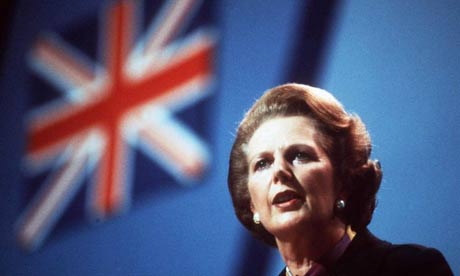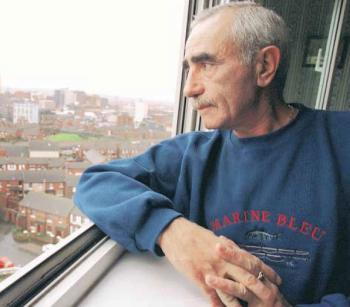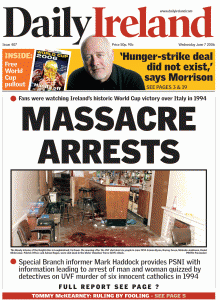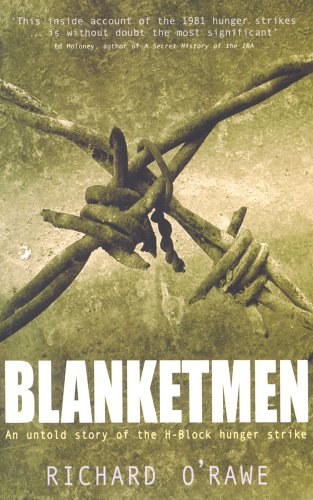EXCLUSIVE – MI5 on Hunger Strike
March 19, 2009 · Bobby Sands Trust
“There was absolutely no change in the government’s position.”
An unpublished interview with Sir John Blelloch, a member of MI5 who had been seconded to the NIO as a Deputy Secretary at the time of the 1980 and 1981 hunger strikes, has come into the possession of the Bobby Sands Trust. The interview was conducted at the British Ministry of Defence in late September 1986 [where Blelloch was Permanent Under Secretary] by the author of ‘Biting At The Grave’, Padraig O’Malley, professor at the University of Massachusetts, Boston.
What is important about the interview is that it represents an insight into the psyche of the British at crucial periods in the hunger strikes, particularly at the time of mediation attempts by others, including the Irish Commission for Justice and Peace [ICJP].
O’Malley twice interviewed Blelloch: in September 1986 and again on 23rd November 1988. Below is an unedited extract from the September 1986 interview dealing with the death of IRA Volunteer Joe McDonnell, and is followed by Blelloch’s analysis of the first hunger strike. It is illuminating in that the interview was conducted long before the publication of ‘Ten Men Dead’, which reveals the republican analysis, and it shows the intransigence of the British government throughout both hunger strikes.
Padraig O’Malley [P.O’M]: On the second hunger strike, were there any differences, again the assumptions made, which influenced how policy was made?
John Blelloch [JB]: No, I don’t think so. I’m afraid, of course, that we all, I think, realised that the second hunger strike was more likely to lead to someone dying, particularly as we read, as I read, Sands’ personality. He, having been the leader the first time round, volunteered himself for the second. He did so in a way which left him personally very exposed if only because he went on first himself. I don’t think that was an accident. I think it’s very probable that Sands was determined to put himself in a position in which he did not have to take the decision that somebody else should die, which, of course, was the position that the leader of the first group was in. So, when the second strike was announced, I think most of us felt that Sands personally, and maybe some others, would go through with it, but the issues, I’m afraid, seemed to be what they were before. One response to the new situation was that we continued to be, I think, pretty generous in the facilities that we allowed for third parties to go in and see for themselves and talk to the prisoners and, as you’ve spoken to Michael Alison [Prisons Minister], no doubt he’s talked to you about the Irish Commission for Justice and Peace which I think was the last major effort by third parties to do something about this. But I think the issues were the same.
P.O’M: Let’s talk about that. In fact, if you wouldn’t mind, I might come back to see you again in November sometime because I’ll have this typed up and sent on to you in the meantime and it’ll allow me to get so far because there’ll be some ancillary questions that I’ll have. But that period, I think it was from the 3rd to the 11th of July when the Irish Commission for Justice and Peace…
JB: I’m sure you’ve got the dates right. I thought it was slightly earlier than that, I must say.
P.O’M: There was two rounds of meetings, I think. One was in late June…
JB: Well, I remember four meetings, I think, altogether. But, anyway, the facts can be established.
P.O’M: These were the meetings just before Joe McDonnell died and again I think it was a meeting on a Friday which extended well into a Saturday and then the Irish Commission when to the Maze, met with the prisoners and the relatives, came back and met with Mr Alison again and then, according to their version of events, again I think it was you, a senior civil servant, was to have been sent to the Maze to talk to the prisoners. That did not happen. Joe McDonnell died and the talks collapsed. There was suggestions at the time that Mr Alison had been overruled by Mrs Thatcher.
JB: Well, it’s difficult for me to comment. I mean. Again, I suppose I should have refreshed my memory but there were indeed a series of meetings that involved myself, or with a team of officials of which I was one, which supported Mr Alison in, I think, four meetings with the Irish Commission. There was certainly a weekend.
P.O’M: That’s correct. There would have been two before that.
JB: Yes. Well, the first round of meetings were, I’m sure, summarised in a letter that Michael Alison wrote to the Irish Commission for Justice and Peace, an unclassified letter, so the Irish Commission have no doubt got it, sometime in June, I think.
P.O’M: Yes, that would have been in June. There were two meetings in June.
JB: I think there were two more and the problem as always was seeing whether we could find some fresh statement of the government’s position which respected all our, which abided by our principal objectives which we adhered to throughout the hunger strike but nevertheless constituted some sort of opportunity for the prisoners to come off it. As far as I remember the delay on that was actually getting final agreement to the text of what might be said, which was not easy, and in the event McDonnell died before that process could be completed and of course thereafter it collapsed.
P.O’M: But their belief was that – are they mistaken in their belief? – that a prison official should have been sent into the gaol by, was it some time before twelve o’clock the following… I mean, there was a time factor involved…?
JB: I think that to answer this kind of detail, and I’m not evading the question, except to the extent that to answer, at five years remove, questions about what actually should or should not have happened, at the end of very long periods of work, is actually a little unfair. The facts, I’ve no doubt, can be established with the Northern Ireland Office. I know that the Irish Commission at one point were disappointed or professed to be disappointed that at some point when a document was to be taken, yet another of these statements, I suspect they hoped that I might do it and it wasn’t me it was done by somebody else. Why they should have thought it was important that I should do it rather than other officials in the prison department I’ve absolutely no idea, but I am conscious of a memory that there was some disappointment about that. But I think I would like to come back to the fundamentals here. There was absolutely no change in the government’s position on why it stood where it was, what was available to the prisoners and, insofar as one could say this in advance, what would happen as the protest ended. That position remained in all material respects, unchanged. Much of this endeavour was, as I say, to go on restating that in as constructive, as truthful a way that you can, in the hope that the latest restatement would constitute the grounds which would make it possible for the prisoners to stop it. By the same token, we continued to discuss with people so that they were in our minds, and hopefully they were in the prisoners’ minds, to try and facilitate the chance of the prisoners stopping. I have to say that one experience I take away from that process is how impossible it is in that sort of situation for someone to interpose himself between the two parties and remain absolutely uncommitted and neutral. You are bound, it seems to me, if you are any good at all as a human being, to get caught up in a kind of mediation and, of course, in that situation it is always a mediation which requires government, as apparently the stronger party, to stand down. Though I have no doubt they will deny it, I think that is actually what the Irish Commission progressively began to do.
P.O’M: They became a party to it, themselves?
JB: Yes. Maybe unconsciously, maybe unconsciously and in some cases I’m sure unconsciously. I don’t think all, but I think in some. But I think they’d become in a sense drawn into a position in which they believed they were negotiating in a situation which is not really negotiable.
P.O’M: They thought they, in fact, could have arrived at a formula that would, if you wish, become…
JB: I have no doubt they passionately wanted to arrive at a formula and did so for the best of humanitarian reasons. But I do also believe that in these situations it is very easy for the wish to become father to the thought and for the wish to be assumed to be practical when it may not be, at any rate on the sort of terms and conditions that they have in mind.
P.O’M: Could an accommodation have been reached?
JB: Well, what have you got in mind by an accommodation? I’m not sure what your question means.
P.O’M: Well, at any point did the government believe that this in fact could be settled other than by the hunger strike being broken or that that in fact was the only possible end, that there was no other possible end?
JB: I think the government believed with a good deal of justification that the bridge between the so-called five demands and the government’s own stated position, that the gulf between those two was one that (a) was wide in substance because it was to do with what I said at the beginning, it was to do with setting back government policy, and that (b) the prospectus which the government had laid out really did represent the limits to which it was possible for government to go. If that is saying, did I believe that an accommodation which represented government accepting the five demands then I have to say that I think the answer to that is no.
P.O’M: Or that they could find some variation, some formula which might have involved two and a half demands, or something?
JB: Ah well, we heard a lot about that. I mean, at various stages we heard about how we might sort of have a fuzzy kind of free association but my own view is that that would have been a self-deception on our part. It seemed to me quite clear what the prisoners wanted. They wanted the conditions that applied to special category status. In this particular context, that included the freedom to operate within the confines of a compound which was complete freedom. We would have been absolutely kidding ourselves if we had thought that there was anything else they wanted or that by making a perceptible move towards that, we would do anything other than stimulate pressure to get the whole lot. Now, I believe that to be the position.
P.O’M: On the role of the IRA, did the NIO believe that the IRA was coercing or influencing the families not to medically intervene?
JB: I’m not sure I can answer that. I don’t really know what the IRA may or may not have been doing. I prefer to talk about things that I did know about. It would seem to me, on the whole, given the IRA’s record in this sort of thing, pretty surprising if the families had not come under a good deal of pressure to, as it were, back up those of their members that were involved in the hunger strike. That said, that is not to say that there were not those in the families who believed passionately that what their members were doing was right and justified. Many of them may well have done so. So I think it would be an over-simplification to suggest that all families’ support for the hunger strikes stemmed from IRA or INLA pressure. I think that would be an over-simplification. I find it, however, difficult to believe that there was not some pressure applied to that kind to maximise support through the families.
P.O’M: Yes, I suppose what I’m asking, did NIO have any direct intelligence estimates of what the level of coercion or whether or not that kind of coercion was going on?
JB: Well, if they had, they were not made available to me.
P.O’M: Would you see any difference in the decision-making process as it unfolded in the second hunger strike and what it was in the first hunger strike?
JB: Well, I think the short answer to that would be no. I think that, of course, the pressures plainly were higher because people were dying, outside the prisons as well as in, and therefore the pressures on the decision-makers to do something about it were correspondingly greater. But the issue was the same.
P.O’M: But in effect there was nothing you could do?
JB: Yes.
P.O’M: So, in that sense, I might put words in your mouth, if you like, your government too was entrapped by the decision made by the hunger strikers in terms of the options that it had open to it?
JB: Yes. I’m not sure that I would buy the word ‘entrapped’. The government had a very clear and, in my own judgement, a very rational and well-articulated position about why it believed what it did, what it would do in certain circumstances, which, incidentally, it did do. Now, the position the government was put in was one of people saying, I’m sorry but the prospectus is unacceptable and we are going to use extreme methods to try to make you change it. Now, if you say that’s entrapment, that’s your word. I don’t think I really saw it as entrapment myself in a sense of being sort of enclosed. It seemed to me that there was here a collision of principles, if you like. Certainly, a collision of interests and objectives where government had moved as far as it could, had deployed its case as best it could and on which government ultimately simply had to stand. Now, I don’t actually call that entrapment.
P.O’M: Okay, I’ll leave it there. Thank you.
John Blelloch had been seconded before the announcement of the first hunger strike in 1980 from the Ministry of Defence to the NIO in Belfast. As a Deputy Secretary he was one of two who answered to the Permanent Secretary. He was in charge of three divisions: security policy, the prisons department and the criminal justice department. In the first part of the interview he revealed how at the end of the first hunger strike the British government believed that giving the prisoners their own clothes “would have only postponed the final confrontation”.
P.O’M: Could you tell me a bit about the role you played in the first one, particularly in relation to the talks between Mr Atkins and Cardinal O’Fiaich and Bishop Edward Daly?
JB: Well, I think my role on that was simply that of any civil servant tendering advice to a Minister. I would be doing no more and no less in respect of the issues that came up in discussions with the Cardinal and with the Bishop than any other civil servant would have been in tendering advice to the Minister. There was nothing special in my role except in the sense that the Cardinal and the Bishop had decided to take an interest in the hunger strike and conducted a series of meetings both with Humphrey Atkins and with my predecessor in the period leading up to the announcement of the first hunger strike…
P.O’M: I suppose what I would like to get at in our talk is the nature of the decision-making process and what assumptions were brought to bear by different constituencies and their behaviour. For example, maybe I’ll start in the middle. Was there an assumption on the government’s side that the hunger strikes were about the five demands or was there an assumption that they were about something else?
JB: I think that I would have to answer that by saying what I remember about the position – because, after all, it’s six years ago now – and what my assessment of the position was. It seemed to me at the time and has seemed ever since…
P.O’M: This is in 1980?
JB: In 1980. It seemed to me at the time and has seemed to me ever since that the hunger strike was all about an objective on the part of the people in the Maze prison (and I’m for the moment drawing a distinction between the people in the Maze prison and the high command of the Provisional IRA outside it) to set aside that complex of government decisions which had the effect of ending special category status and instead treating everybody convicted of crimes in the same way in terms of the prison regime. Not of course in the same way in terms of sentence imposed, but the same way in terms of the conditions in which they were then imprisoned. So, the five demands as they were expressed, in my view were a shorthand way of expressing the differences between a conventional prison regime of the kind that we operated in the Maze for everybody, on the one hand, and the regime that operated for the special category status prisoners who had been sentenced but then dealt with as special category prisoners under the regime prevailing before that. Hence, the influence and the importance in the five demands or what came to be called free association but which simply meant that prisoners could move around within the confines of their hut or their compound virtually at will with prison staff simply limited to keeping supervision from the perimeter. So, to get back to the basics of this, I think the key assumption here was that the hunger strike was the culmination of a process of protest about the application of the government’s policy for dealing with terrorist crime which goes all the way back to the first man imprisoned after the ending of special category status who refused to wear prison clothes. In other words, in my view, there’s a straight continuum from the blanket, via the dirty, to the hunger strike as a determination on the part of the prisoners inside the Maze to set aside that decision of government about how crime or how acts, be they acts of murder or wounding or whatever, should be dealt with in terms of the prison regime whenever those acts should be prosecuted as crimes before the law so that murder remained murder regardless of motive; a determination to set that aside and return to the old special category status. Secondly, the determination to set that aside seemed to me to go very, very much deeper than simply a view that special category status was something rather more comfortable than the normal prison regime – although that is certainly true. It goes much wider than another thing that I know worried the prison authorities and, I suppose, worried me quite a bit, which was that special category status made it very easy indeed for the chain of command outside the prisons to be extended to within it. If you in effect push your prison guards to the periphery, it then becomes very much easier for a highly determined paramilitary command structure outside then to get its way with perpetuating that command structure inside. But above all, I think what lay behind this was a concern that the activity of the IRA, and the Provisional IRA, should by all means possible be seen as a kind of war, a just war in which the forces of the British and the RUC, a war which ultimately would be won and at the end of which prisoners of war would be released. There was that element of hope in that situation. There was always that element of, if you like, justification for what was being done by having it regarded as war rather than as crime. And I’m sure at the time you would find many, many references in ‘An Phoblacht’, and others, to the criminalisation policy of the British and I, if I were a senior commander of the Provisionals, would not like that because it would seem to be saying rather a lot about how what they were doing was viewed, as it was, crime. So, getting back to what you said about assumptions, I had it as a pretty firm assumption that that was where the springs of the increasing level of protest came from and because that’s where it came from, the demands could not be met. I also happen to believe, though obviously I cannot know, I also happen to believe that senior people in the IRA and elsewhere understood that very clearly as well. Earlier on I drew a distinction between those people in the prison and those outside it. Again, I don’t know this, but I’ve always suspected that the command structure outside the prisons did not want a hunger strike because the protest that was already going on was, from their point of view, an extremely effective propaganda platform. The dirty protest was an appalling thing. It was fairly easy to represent it as if it were the fault of the British authorities and to arouse very understandable sympathy about the conditions in which these prisoners were being expected to live. I’m bound to say, it seemed to me likely that the IRA authorities would have been happy to have seen a continuation of that situation almost indefinitely and that by going to a hunger strike, while, of course, there must, I suppose to some, have appeared the possibility that it would be successful, that is to say, that the government would actually concede a return to special category status, the possibility must always have been present that it would not be, in which case there was no other level of protest in the prisons left. Now, of course, the hunger strike having been declared, there could be no question then that the whole apparatus of the Provisional IRA and the INLA was swung in behind to support the hunger strikers and that’s how it emerged.
P.O’M: So, the assumption would have been that at the time of the first hunger strike, it was a hunger strike initiated by the prisoners themselves?
JB: Yes, that certainly was my own view, that the thrust for the first hunger strike, and subsequently the second, came decisively from inside the prison. As I say, it’s my own assumption. I don’t know this because I’ve not talked to the people concerned about it, but my assumption certainly would have been that the wellsprings for this came from inside the prison. It’s very easy to understand why it should have, because after all it was they who were having to support these conditions, it was they who could see that over a period of years it wasn’t actually getting anywhere in terms of satisfaction of the demands and one could quite see why from within the prisons there should have been a mood which said that we must raise this level of protest and bring it to an end. It also seems to me quite possible for the prisoners inside the Maze to have misjudged how the British government might react. It is conceivable that they were deliberately misled on that though I don’t know, but I can certainly see how it would be easier for them to have misjudged it.
P.O’M: In terms of the first hunger strike there was a forewarning. I mean, again Cardinal O’Fiach’s three weeks and Bishop Daly had said that the prisoners were planning to go on a hunger strike and my understanding from talking with them and reading newspaper accounts of the time that they were of the view after talking with the prisoners, those on the dirty protest at that point, that had the demand to wear their own clothes been met, that the situation would have been defused.
JB: Yes, I’m well aware of that view, of both those views. As to the first, that a hunger strike was coming, it was not, of course, the first time in the history of the dirty protest that hunger strikes had been threatened. In this particular case, the Cardinal and the Bishop were right. I had only, as I say, literally been there about two or three weeks by the time this broke and therefore I don’t know that my opinion as to whether or not a different judgement should have been taken by the NIO is worth anything. But all I would say, however, is that I myself would not have been surprised if the view had been held that a hunger strike was unlikely for precisely the reasons I’ve given you. That it was a final throw, which of course carried with it the possibility that it might win; but clearly also carried the possibility that it might not, and that the consequences – I don’t like talking about winning and not winning in these circumstances, so forgive that – but the possibility was clearly that that form of extreme pressure would be resisted and the consequences for the IRA and INLA of that happening were in fact quite serious. Therefore, it always seemed to me a wholly rational view to take, that a hunger strike would constantly be threatened but never actually put into effect. Now, in fact, it was put into effect very shortly after I arrived, so that raises a second question. Would the whole thing have been avoided if the British government had conceded the wearing of own clothes? I have to say that on that I simply disagree with the Cardinal and the Bishop because I feel myself that while the wearing of own clothes had enormous symbolic importance in all this, it was one, but only one, and arguably by no means the most important of the five demands. I personally would rate the demand for free association as being of much higher importance. I believe, therefore, that if the British government had said, “Alright” – at the time the hunger strike was threatened – “you may have your own clothes,” against the background of the case for the amelioration of prison conditions having been quite decisively thrown out by the European Court, there were no humanitarian grounds for this change whatsoever, for the British government to have conceded own clothes in those circumstances would, in my view, not only not have brought a final end to the prison protest – because I believe the prisoners would have still wanted free association and the other appurtenances of special category status – I believe myself that the prisoners might well have been encouraged to believe that by threatening further hunger strikes they would have got the remaining demands. So, my own judgement would be that at the very most, the granting of own clothes would have, on the whole, encouraged the prisoners to believe that their confrontation would be successful. In the meantime, it would have run the risk in the rest of the Northern Ireland community that, confronted with this sort of threat, British governments will always back down, which would then encourage other people to make the same kind of threat. Now, I’m putting my judgement against those of the Cardinal and the Bishop and that is a presumption because they know the province. But that would be my answer and those would be my reasons for giving it.
P.O’M: From the moment the hunger strikes began, this is in 1980, from October 1980 until December 1980, were there any attempts to negotiate – I’m using that word very loosely – a settlement?
JB: No, there were not. There were a number of opportunities taken, if you like, or even created, to remind the prisoners and everybody else who might be interested as to what the prison conditions were that were available to them should they come off the protest. And I can think of at least one very extensive handout that was made available to the press and to the prisoners and to everybody spelling out in very great detail what the regime in the Maze was and what would happen, what the position would be if they came off. But negotiating in terms of sitting down with the prisoners or anybody else for that matter and saying, “Well, if you do this, we will do that”, no. Because it wasn’t – and I think this is also quite important – a negotiating situation in the sense that, say, an industrial dispute is a negotiating situation. I certainly did not see it in those terms and I don’t think anybody else in a responsible situation did either.
P.O’M: Well, did the government deal with intermediaries as to… ascertain what the prisoners might find an acceptable compromise, or was it simply accepted that the prisoners would not compromise?
JB: No, I think again, two answers to that. I think the government’s position was to lay out very clearly what was available, which, I may say, many of the people on the dirty protest had never actually experienced. They’d been on protest from the moment they came in and therefore were subject to various kinds of forfeit of privileges and so on. The government’s position was consistently to remind people what the facts were about the conditions in the Maze because there was a great deal of misrepresentation about the H-Blocks being a hell-hole. Quite the contrary. The conditions that were available – there are no comfortable prisons – the conditions there compared immensely favourably with prison conditions anywhere else in the UK. There was a major effort made to make sure that everybody who ought to know, and preferably who wanted to know, did know what the conditions were like and therefore what was available to prisoners should they come off the protest. Secondly, and perhaps rather more controversially, the government quite deliberately took the position that people of genuinely goodwill should have access to the prison, not as negotiators or interlocutors or intermediaries or anything like that, but simply so that independent persons of high-standing should themselves have a chance to talk both to us in government and to the prisoners and to that extent, therefore, be in a position to represent views of the one to the other, but not to act as negotiators. Now, of course, to the extent that the prisoners talked to whoever it was – the Red Cross or any other body who went in – we would always take a great deal of trouble to be debriefed on what they had to say and we would listen extremely carefully and in particular for any sign that there was anything we could do cosmetically or otherwise to make it easier to bring the hunger strike to an end. But there was no question at all, either of direct or indirect negotiations with the prisoners – that wasn’t the name of the game.
P.O’M: The first hunger strike, in fact, collapsed quite suddenly when Sean McKenna, his eyesight began to fail. Let me go back and tell you what some of the prisoners that I’ve talked to have said. That somebody came from the Northern Ireland Office with a document, even though the document was the same document that was released later by Humphrey Atkins, that assurances were given that once the hunger strike was over that the government would be conciliatory.
JB: Well, I don’t know who they’re talking of. They’re probably talking about me. I went down to the prison, the only Northern Ireland official, I think to do that. I’m now trying to remember how many times I did go down there and when. I think the only Northern Ireland Office official that went down to the Maze in the context of the first hunger strike was myself. I went down and saw the seven and I had with me the text of the document describing really just what I’ve said to you about the conditions in the prison.
P.O’M: Is this the document that would have been released…?
JB: It’s about December, isn’t it? It’s a very long press statement.
P.O’M: December 19th?
JB: No, it’s a very long one.
P.O’M: December 4th?
JB: It’s that one, I think.
Blelloch reads through the document.
JB: No, I don’t think it was, funnily enough. There were so many. This was, I think, produced very early in December. The one I’m talking about is slightly earlier than this. This is a press statement that was – I mean, it says what it says – that’s what was released and it was, in fact, put into the prisons on the Thursday night which, I think, actually was the night they called it off. Isn’t that right?
P.O’M: That’s correct.
JB: I think that’s right. I can’t now remember how that document was got into the prison but I think it was just delivered down to the prisons for issue to the prisoners. This is on the night that McKenna, that it was called off. No, I’m talking about an earlier document which I think pre-dates that by a week or ten days. It was freely available and it was published and my memory is that it was a very full statement about the conditions in the prison and how the government would approach a post-hunger strike situation. I went down to the prison to talk to the seven prisoners who had had that document for some hours before I arrived and I was there, really, to say to them, look, if you’ve got any questions about this I’ll answer them. To make absolutely sure that there was no question of private assurances, my memory is that the prison governor was present throughout as was one of the warders, so there was absolutely no question of my or anybody else from the NIO going into corners to do deals. Of course I was asked how would the government behave and I said, well, it’s in there and I am here to try to persuade you to take up this offer. As to the government being conciliatory afterwards, the first thing that of course did happen after the strike was over was the government implemented a decision which it had been working on ever since the announcement was made, actually to get into the hands of the prisoners the civilian-type clothing which had been agreed – not that they owned, that we owned – that we should get into the prisoners’ hands the civilian-type clothing that government had already decided should be introduced and which we had been procuring over the months of the strike. So, in terms of being conciliatory, at least that gesture was made and made very promptly.
P.O’M: I suppose, what I’m getting at is, there was a period between the 19th December and the date on which the second hunger strike was announced, that would be the 7th February, when there was uncertainty, some confusion at least on the prisoners’ side. I think on the 23rd January a number of relatives handed in clothing which was accepted and then, it was on a weekend, the prisoners weren’t allowed to wear it and those that had become conforming smashed the furniture in their cells and became un-conforming again. I suppose my question would be that since after the ending of the second hunger strike the issue of clothing was conceded, why could the government not have made that gesture after they had effectively won on the first hunger strike? Could the second hunger strike have been avoided?
JB: Well, I’ve given you my answer to that. I think the answer to that is no. The second hunger strike could not have been avoided in my view by anything the government did on clothes. That is my personal judgement because I think the contents of the five demands comprehended a great deal more than that. The comment, I suppose you would get is, well, yes, but if the government had been generous at that time, then, you know, public sympathy would have swung behind the government and all the rest of it. It probably would, but I don’t think it would have done so permanently. I think that had the government done something more about the issue of civilian-type than it did then I am quite sure that the impact of that would have been temporary and a hunger strike would then have been mounted, as I think it would, for the remainder of the five demands. Then, as I said earlier, we should have been in just as difficult a position as we were in October 1980, or, arguably, more difficult because a concession on one of the five demands having been made, then what are your grounds – moral, practical, whatever – for resisting the others? As to the difference between January 1981 and October 1980, again there was a very complicated sequence of events at both periods. But my memory is that there was indeed a period of confusion within the prison as to what the precise circumstances were in which the first hunger strike had been brought to an end, and I have no doubt that there were those with a very strong vested interest in putting it about that the government had made some kind of sub rosa [secret] deal here which the hunger strike having been ended, they were now reneging on. I personally find that an extraordinarily, implausible position because it’s a renege that was so obviously going to be transparent if it had occurred. What instead we found ourselves in, as I recall it, was a situation in which the first hunger strike had been called off, the government had implemented what it had said it was going to do about the issue of civilian clothes, civilian-type clothes, that it was always the position that the wearing of own clothes was a privilege and not a right, to be available to prisoners who were conforming with the regime, and while people did come off the dirty protest at that stage, they were still not conforming. In particular, they were refusing to work. Now, what we tried to do in January and early February was to take a series of carefully graduated steps to see whether we could wind the level of protest down and accompany that with relaxations of the level of punishment imposed, mainly to do with relaxing the number of days forfeit. Our objective in this was to try to move the protesting population from a condition of protest to one of conformity by very easy steps. Maybe we were wrong to do that, but that’s what we did and we got to the point at which the next move would have been for the prisoners to conform by agreeing to work on the Monday which would then have entitled them to wear own clothes. Now, what I would like to have done…
P.O’M: To wear their own clothing in the evening?
JB: Yes, but the wearing of their own clothing in the evening, as I recall it, was a privilege, not a right, and it was a privilege afforded to fully-conforming prisoners, withdrawn as part of the complex of punishments available. At the stage that we are talking about my memory is that while we had succeeded in winding down the level of protest, we had not wound it down to the point at which the prisoners had agreed to work in particular and therefore become fully conforming. My memory also is that the previous weekend – the first opportunity when this would have occurred, I think, would have been the Monday – and my memory is that on the previous Saturday, fairly well arranged, a number of prisoners’ families brought with them their own clothes which were deposited in the prison. But the prisoners were not allowed to wear them because they were not conforming prisoners and, of course, then they did, in fact, refuse to work. Now, at that point, they smashed up the furniture and, in effect, the protest was fully back on again. My recollection is that at the time, we put out a series of notices directed mainly at the prisoners, explaining very carefully what was going to happen next and why. But the key element of this was that the wearing of own clothes still remains under the prison regime a privilege, not a right, and a privilege afforded only to prisoners who are fully conforming. I’m pretty sure that it was a tactic of the prisoners to try to get into a position in which they actually could lay their hands on their own clothes, would then put them on, invite us to remove them by force, but at the same time refuse to work and that was a confrontation that we were anxious to avoid. It’s all a bit complex, but the interesting thing about that January period, as I say, is that it was our initiative, not the prisoners’, which sought to try to wind down the protest and it failed.
Sir John Blelloch, who retired from public life in 2007, was Permanent Under Secretary of State at the Northern Ireland Office from 1988 to 1990, having previously served as a Deputy Secretary in that Office from 1980 to 1982, while resident in the Six Counties. Between these appointments he held the posts of Deputy Secretary (Policy) and then Second Permanent Under Secretary at the MOD. After the Belfast [Good Friday] Agreement he sat as Joint Chairman, alongside South African lawyer Brian Currin, of the Sentence Review Commission which was involved in the release of political prisoners, including former hunger strikers and hundreds of former blanket men.
Sourced from the Bobby Sands Trust website






 Denis Bradley, the link in Derry for more than two decades between MI5 and the IRA, claims that the IRA leadership had been handed a deal in early July 1981 – which eventually the prisoners did accept, but only after six more of their comrades had starved to death. Bradley’s account contradicts claims by loyal supporters of Gerry Adams that there had been no offer on the table in July that could have ended the hunger strike after four prisoners died.
Denis Bradley, the link in Derry for more than two decades between MI5 and the IRA, claims that the IRA leadership had been handed a deal in early July 1981 – which eventually the prisoners did accept, but only after six more of their comrades had starved to death. Bradley’s account contradicts claims by loyal supporters of Gerry Adams that there had been no offer on the table in July that could have ended the hunger strike after four prisoners died.


 Blanketmen
Blanketmen It has withstood the blows of a million years, and will do so to the end.
It has withstood the blows of a million years, and will do so to the end.